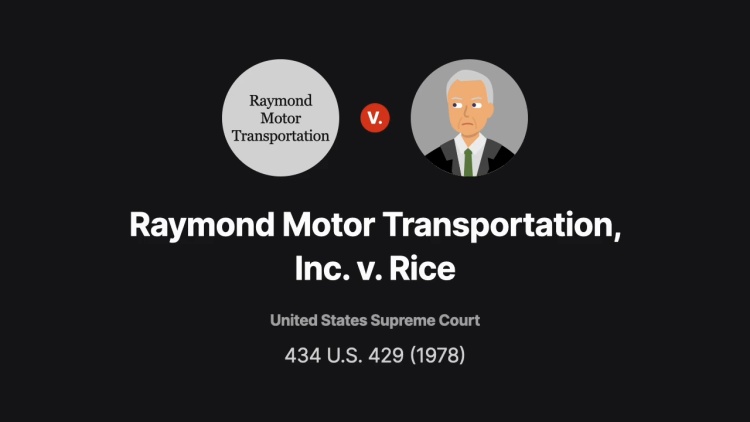Raymond Motor Transportation, Inc. v. Rice
United States Supreme Court
434 U.S. 429 (1978)
- Written by Rose VanHofwegen, JD
Facts
Wisconsin law generally prohibited trucks longer than 55 feet on its highways but permitted a patchwork of exceptions. For example, municipal trash haulers and milk companies could use tandem trailer-trains up to 100 feet long with a permit. Truckers could also haul empty trailers in tandem to and from truck dealerships or for repairs. Raymond Motor Transportation, Inc. and Consolidated Freightways Corporation of Delaware (the haulers) (plaintiffs) wanted to use trucks hauling two trailers, called doubles, totaling 65 feet in length, but Wisconsin denied them permits. The haulers sued, arguing that the Wisconsin law unduly burdened and discriminated against interstate commerce. The complaint alleged that the limit disrupted and delayed interstate commerce, 65-foot doubles were as safe or safer than 55-foot singles on limited-access highways, and the maze of exceptions meant Wisconsin routinely granted overlength permits for virtually identical 65-foot doubles. The haulers presented extensive evidence that the Wisconsin laws substantially increased trucking costs, caused delays changing trucks, and prevented acceptance of interline transfers from other companies. Attorneys for Wisconsin argued that longer trucks take longer to pass than shorter trucks but failed to show the 55-foot limit actually contributed to highway safety. The district court nonetheless found the Wisconsin statutes constitutional. The haulers appealed.
Rule of Law
Issue
Holding and Reasoning (Powell. J.)
Concurrence (Blackmun, J.)
What to do next…
Here's why 907,000 law students have relied on our case briefs:
- Written by law professors and practitioners, not other law students. 47,100 briefs, keyed to 996 casebooks. Top-notch customer support.
- The right amount of information, includes the facts, issues, rule of law, holding and reasoning, and any concurrences and dissents.
- Access in your classes, works on your mobile and tablet. Massive library of related video lessons and high quality multiple-choice questions.
- Easy to use, uniform format for every case brief. Written in plain English, not in legalese. Our briefs summarize and simplify; they don’t just repeat the court’s language.





